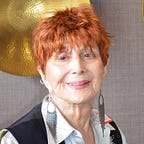Sir Winston Churchill’s Daughter Sarah Has Been an Actor, a Poet, is a Survivor
Married three times, all the men in her life have died. She says her life “has been spotted with happiness.”
The Washington Star-News, November 4, 1972: Sarah Churchill is not the sort of actress who “waltzes in with swansdown on roller skates.” She uses the expression, not unkindly, to describe extroverts such as the late Tallulah Bankhead. For herself, she’s “basically shy. The only time I’m not self-conscious is when I’m acting.”
It’s not the impression you get at first sight.
There she is, truly English mod; red hair tucked under a jaunty billed corduroy cap, brown suede jerkin hooked together with gold chains, a huge gold pendant, honey-colored “trousers” (as she calls them). But her large amber eyes reflect the accuracy of her self-assessment.
The daughter of Sir Winston Churchill, who has been in the headlines and the limelight all her life, chain smokes, goes from one chair to another, is slightly unglued, all because of a simple interview. Miss Churchill is in town to launch a 21-day, five-week tour to promote the first in a series of five sterling silver collector plates by Silver Creations, Ltd., commemorating her illustrious father.
The first plate, “Hour of Decision,” shows Sir Winston standing before the Parliament building. Designed by her cousin, John Spencer Churchill, the plate comes in a box the top of which is illustrated with a charming watercolor by Miss Churchill. She depicts the protruding stomach, the fur-collared coat, the ubiquitous derby and the cigar; the face is left to the imagination, but it is an unmistakable likeness of Sir Winston.
She did it many years ago on one of the “lovely holidays” she used to take with her father, who died in 1965. All the men in Miss Churchill’s life are dead. Her father, her brother, Randolph, her three husbands. Her life as been “spotted with happiness — I’ve had my share,” filled with drama and punctuated with tragedy.
She met her first husband, comedian Vic Oliver when she was 21 and a member of the chorus line in a revue at the Adelphi Theater in London. “He was 20 years older, a father-image. He taught me an enormous amount about the theater.” They were divorced in 1945. “The war split many people.” Three years later, she married society photographer Anthony Beauchamp. They were estranged at the time he committed suicide in 1957, and for several years she had bouts with the police and the courts because of a drinking problem.
In 1962, she married Harry Audley — “I was very happy, it was certainly one of the happy spots of my life” — who died a year later.
At 57, she is gallant, still beautiful, and very much alone. She’s had a long, full career, part of it in America, on Broadway and in films. “I came for four days and stayed nearly nine years, like ‘The Man Who Came to Dinner,’” she says. She came to open a theater in Toronto for British film producer Arthur J. Rank, stopped off in New York and was prevailed upon by Gertrude Lawrence and her husband, Richard Aldrich, to play in their theater in Westport, Conn.
She describes the late Miss Lawrence as “enchanting, extremely humorous and a very good friend.” Returning to London, Miss Churchill appeared as Sadie Thompson in “Rain,” and Peter in “Peter Pan.” But it’s been many years since she’s been in a play.
“When I married Harry, we decided to live in Spain. I virtually gave up my career and became a wanderer.” After his death, she wandered alone for several years before returning to live in London.
Now she has a one-woman show, “An Evening with Sarah Churchill,” which she takes out on the road or on TV about 10 times a year. In it, she reads her poetry and that of others — sings and dances. “I call it movement now,” she laughs, stretching the word to show her style is much slower now than when she started her career as a dancer at 17.
She would love to do a contemporary show, “but I haven’t been very fortunate in that. All the ones I’ve been in have lasted about four days. I call that all work and no play,” she says with a wry grin. She still gets plays to read but, “I can’t feel my way in them. I can’t place myself,” she says. “I don’t think you can organize yourself as much as you think you can. Things happen to you in their own time.”
She had a simple and happy childhood and only gradually realized she had “an exceptional father.” From then on,”one became more detached from him. One sat back and observed and listened much harder to his conversations. Not that Sir Winston was ponderous. He had a great sense of humor. He had a tremendous enjoyment of life and never wasted a moment.”
Of her family, her mother, Clementine is “absolutely splendid” at 87. One sister, Diana, is dead. Another, Mary, the wife of Sir Christopher Soames, British ambassador to France, lives in Paris.
Miss Churchill, like her father, also is a writer. She has two books to her credit. One is a book of poems, “The Empty Space.” She’s been writing poetry since she was 17. The other “A Thread in the Tapestry,” based on family letters, is “a loving tribute I paid to my father.”
She says she doesn’t need to write her autobiography.
Original headline: “My whole life is in those two books.”Sarah’s Life Spotted With Happiness
